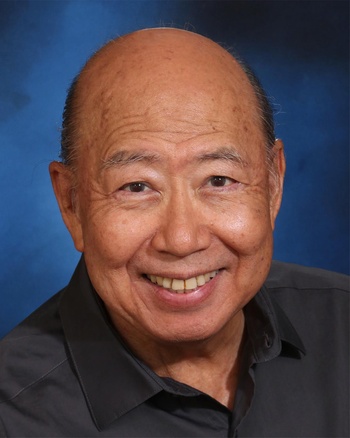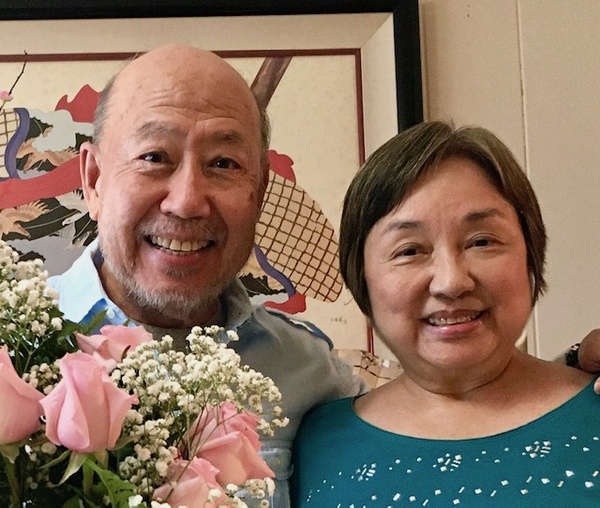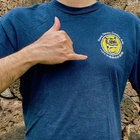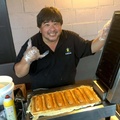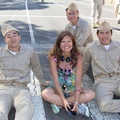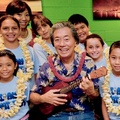Dann Seki, 78, stay one Hawai‘i acting icon. He grew up in ‘Aiea on O‘ahu in da 1950s back when ‘Aiea wuz just one small plantation town and nevah have nahting around but miles and miles of sugar cane. But luckily da town did have not one, but TWO movie theatres. Where get ‘Aiea Shopping Center now, Dann says there used to be one movie theatre that dey called Up Theatre. And below Moanalua road around where get da post office now had one noddah theatre which dey called Down Theatre. So dey always had one choice of which movie dey wanted for see. Eventually Dann would become quite one prolific and accomplished actor himself working steadily doing radio, commercials, storytelling, theatre, movies, and television guest spots on top Byrds of Paradise; Baywatch Hawai‘i; Lost; Hawai‘i Five-0; Doogie Kamealoha, M.D.; da old Magnum P.I.; da new Magnum P.I.; ah, let’s just say pretty much almost every Hollywood series that wuz filmed in Hawai‘i since da late ’80s.
* * * * *
Lee Tonouchi (LT): Brah, everytime I run into you, you seem like one supa-nice guy, but you also one supa-talented actor. So how I know if you one supa-nice guy like fo’ reals?
Dann Seki (DS): (Laughing) I have always questioned which persona, which me, is the real me, you know, or am I always just putting on an act, so to speak? Yeah, so I'm not sure.
LT: (Laughing) How you identify? Local Japanese? Japanese American? Nikkei? What?
DS: I'm obviously Japanese, but I want to make sure that people know that I’m American and not from Japan. So I would have to say I’m Japanese American.
LT: So what school you went?
DS: ‘Aiea High School, class of ’64. You know, we were actually the first graduating class. So prior to ‘Aiea High School being built, if you lived in that area you had to go to Radford. Bette Midler was one year older than me and so she went to Radford.
LT: Wuz you one good liar as one kid since actors is basically just professional liars?
DS: (Laughing) I would say I wasn’t in a position most of the time where I had to lie. Life was simple. In those days ‘Aiea was a slow-moving plantation town and so the kids ran around hadashi, bare feet most of the time. As kids we’d just go find a stream someplace and look for mosquito fish or crayfish, so there was never anything to make excuses about.
LT: When you wen discover you liked acting?
DS: I would say in high school. A lot of times I was called upon to be like the MC or the program announcer and we would put on these little skits and things. I’m playing psychologist here, but my basic personality is an introvert and so being on stage allowed me to be that extrovert that maybe I actually secretly wanted to be.
LT: You took acting in college den?
DS: I was at UH [The University of Hawai‘i at Mānoa] during the Vietnam War. And so it was critical for us as students to stay in school because if you weren't, you get drafted. And so the reason for not doing theatre at UH was that I had to spend all my time just trying to stay in school. But I was in Army ROTC, and I did that on the advice of some friends who said, if you’re going to go into the war, you might as well go in as an officer as opposed to going in as an enlisted person.
LT: So how you came one actor den?
DS: It was kind of on a whim. If you're active duty you can get an advanced degree and the Army or the VA will pay for it. Well, I didn't need a graduate degree because I already had one. And so, one of the things I used it for was Columbia School of Broadcasting where part of the training is that they put you as an intern in an actual radio station after you finish with all the coursework. And so I was at station KORL and one of the guys who was a DJ there was also an actor. And so one time, he says, “Hey, you’re interested in acting?” And I go, “Actually, I am!” He goes, “Well, why don’t you sign up with my agent and maybe you’ll get something.” I go, “Why not?”
LT: Who you grateful to for supporting you on your journey to coming dis well-respected actor?
DS: It’s kind of hokey, but it’s true. So I’m going to say my wife. I couldn’t have done acting if it wasn’t for her support because I still had my regular job, see. So if it wasn’t for my wife’s encouragement, acting would be kind of tough to do, because I was hardly at home on the weekends when I’m sure she would’ve had a whole bunch of stuff for me to do around the house!
LT: (Laughing) We gotta make sure we write her name den. What her name?
DS: Sharyn, spelled S-h-a-r-y-n Sekine.
LT: So you guys get diff’rent last names?
DS: No. Same.
LT: Hah?! How you figgah!?
DS: It's because Dann Seki is not my real name.
LT: Whaaaaat? You mean you been actor-ing to me dis whole time?! Seeeeee, professional liar, brah!
DS: (Laughing) So while I was at KORL radio station, I was also in the Army Reserve. And so I’m on the air and I’m signing off saying, “Hi, this is Dennis Sekine and I’m going to do my duty for Uncle Sam. I’ve got my two weeks of active duty. I’ll see you when I get back.”
So my co-worker looks at me and goes, “You know Dennis, that probably wasn’t a good idea.” And I go, “What do you mean?” He says, “You just told people you’re going to be out of town for two weeks. So if they look you up, they can find out where you live. They might rob you.” I go, “I never thought about that. What should I do?” He says, “Well, maybe come up with a different name.”
LT: So how you came up with your actor name?
DS: Sekine has always been an issue with me in terms of difficulty with people who don't even realize it’s Japanese. That and people don’t know how to pronounce it. So I went with Seki because that's also a Japanese name, but shorter, right? And most people can recognize Seki as Japanese.
But then Dennis Seki just didn't roll off the tongue. So I changed my first name too. I changed it to Dann and I added the second N to indicate that it was not short for Daniel or Danny.
LT: You can try talk about your first film role, da 1989 Andy Sidaris B-movie called Savage Beach.
DS: They shot that on Moloka‘i. A lot of nakedness. I was not there on the days they shot the nakedness, unfortunately. The story was really just an excuse to expose the two lead women who were Playboy centerfolds. They weren't too shy about removing their tops so to speak. Oh, and one of the guys in it was the Playgirl centerfold and so he kind of bared his butt too.
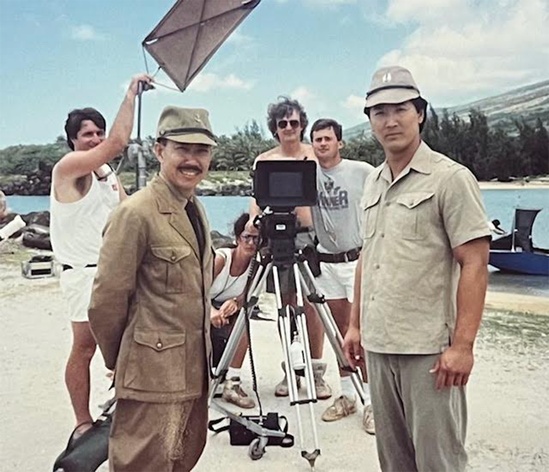
LT: You also get serious kine, WWII Japanese American kine roles. You can try talk about da importance of these films.
DS: I think it’s good to remind the next generation about things that went on before. I did Go for Broke: An Origin Story, which was about the 442. Under the Blood Red Sun was about the activities that took place in Hawai‘i during the war and the restrictions that were put on the Japanese American citizens. The community leaders were shipped off to internment camps because it was feared that they would lead the Japanese resistance to the war. This was life in the United States during the war period. The younger folks need to be reminded that this did happen. And it’s a fact, it’s history, and you have to understand it in order to make sure we don’t make the same mistakes again.
LT: Ova da years you did planny smaller spots on top various TV shows. Did you eva wish you could be Thomas Magnum or Steve McGarrett, or what?
DS: (Laughing) If you’re a Local actor here, most of the time we get bit parts. If you’re lucky, you get more than one page of dialogue. So I think the hope most Local actors have is that they will get cast in what we call a recurring role, not a regular role necessarily, although that would be great too, because on a regular role your name and picture is flashed on the opening scenes for the series. But if you can’t be a regular, a recurring role is also very desirable because that means your character is brought back several times during the run of the show, which is good from a job standpoint. It means that you got regular work.
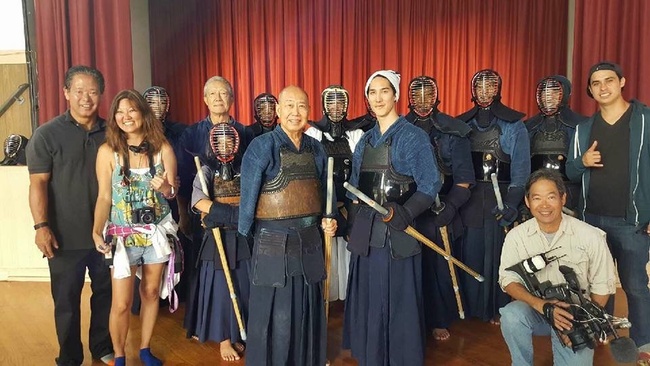
LT: Do you tink it wuz harder for get mo’ bigger kine film roles cuz of your ethnicity?
DS: Not really. I mean, the whole idea of getting cast in a role in a movie or a TV show that was shot in Hawai‘i is that they wanted Locals. And so being of a particular ethnic group was kind of advantageous. They're shooting in Hawai‘i so they naturally want Hawai‘i-looking people.
Although, one of the complaints that the Local actors have is that a lot of the roles where they ship in actors from L.A. could have been done by a Local actor here. So it’s not so much the ethnic background, but I think it’s kind of a mindset of L.A. that they think there aren’t any real qualified actors here in Hawai‘i, so they bring somebody in from L.A. to do these meaty guest roles.
LT: You also acted for like almost every theatre group in Hawai‘i. But if you had for pick one play that wuz your favorite, you can try tell which play wuz that and how come?
DS: Oh, that’s easy. Aloha Las Vegas. That’s an Ed Sakamoto play and I think I’ve been part of at least seven, maybe eight productions of Aloha Las Vegas. Most of them done by Kumu Kahua Theatre.
Over the years I played two different roles in that thing, which is really fun. But the reason we did it that many times is because the subject matter still is appropriate even today. Because the main character, Wally Fukuda is wrestling with the idea of moving to Las Vegas, which a lot of families are still doing, right? He says, “Should I move to Las Vegas, the property is cheaper, right?” So we’re still able to do it again and again, mainly because the topic is still current in the sense that people are still going through this same dilemma.
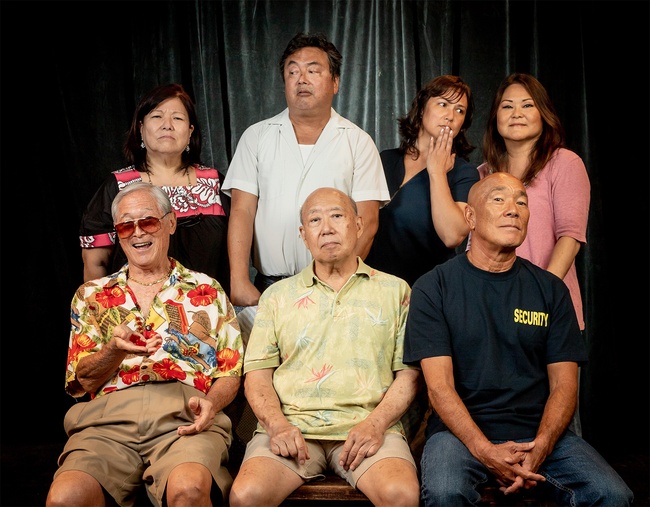
LT: If one young actor came up to you and said, “Excuse me, Mr. Seki, sir, do you have any acting wisdom that you could possibly share with me?” What would you tell ’em?
DS: I would say to be as honest and true to your perception of the character as you can. One of the directors I worked with used to always require that the cast members write a backstory on their character. Because the play is a snapshot in time for the most part. It’s a good exercise because then you feel like you got a real person that you're playing, not just the words on a page. How you say the line or even just trying to remember the lines becomes easier because it makes more sense. Even if it’s a whole page of dialogue, you can do it because it’s you. You are the character.
© 2024 Lee A. Tonouchi


